|
OVERVIEW
In conjunction with Holbrook Travel, Hilton Pond Center for Piedmont Natural History is offering exciting and educational field trips in January & February 2008 to study Ruby-throated Hummingbirds on their wintering grounds in Costa Rica.
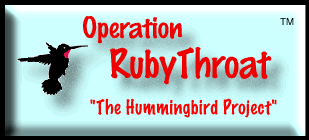 Ruby-throated Hummingbirds Archilochus colubris--which occur in 38 U.S. states and across southern Canada from April through early October--are the most widely distributed hummingbird species. Nonetheless, they are poorly studied in Mexico and Central America where they spend their non-breeding months. Ruby-throated Hummingbirds Archilochus colubris--which occur in 38 U.S. states and across southern Canada from April through early October--are the most widely distributed hummingbird species. Nonetheless, they are poorly studied in Mexico and Central America where they spend their non-breeding months.  During our fifth (and sixth) eight-day field trips to Guanacaste Province in northwestern Costa Rica, Center director Bill Hilton Jr. will show participants how hummingbirds are observed, captured, banded, and released and teach how to implement observational protocols that are part of "Operation RubyThroat: The Hummingbird Project" and The GLOBE Program. Along the way participants will visit diverse habitats and learn about fascinating aspects of Costa Rican natural history and culture--from volcanoes to Pacific coastal ecosystems, from coatimundis to tropical butterflies. During our fifth (and sixth) eight-day field trips to Guanacaste Province in northwestern Costa Rica, Center director Bill Hilton Jr. will show participants how hummingbirds are observed, captured, banded, and released and teach how to implement observational protocols that are part of "Operation RubyThroat: The Hummingbird Project" and The GLOBE Program. Along the way participants will visit diverse habitats and learn about fascinating aspects of Costa Rican natural history and culture--from volcanoes to Pacific coastal ecosystems, from coatimundis to tropical butterflies.
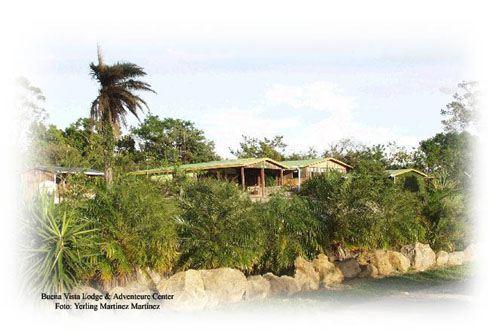
Each eight-day expedition will be based at Buena Vista Lodge & Adventure Center (above), used by many international tour companies because of its excellent accommodations, food, and proximity to outstanding Costa Rican nature locales. The rustic-but-comfortable cabins have hot and cold running water, clean towels daily, and private indoor toilets and showers; the dining room offers fresh fruit, meats, and vegetables at every meal, so you defintely won't be "roughing it."
Guanacaste Province, in northwestern Costa Rica (red star on map below), borders Nicaragua. Unlike the Caribbean side of the Costa Rica, the west coast is drier; rather than tropical rain forests, Guanacaste has tropical DRY forests--some of which are evergreen--and there are expanses of grassland that even today are used by cattle and horse ranchers. Some ecologsts liken the terrain, climate, and vegetative structure of Guanacaste to that of West Texas in the United States--except there are several active volcanoes overlooking pristine Pacific beaches in Guanacaste!
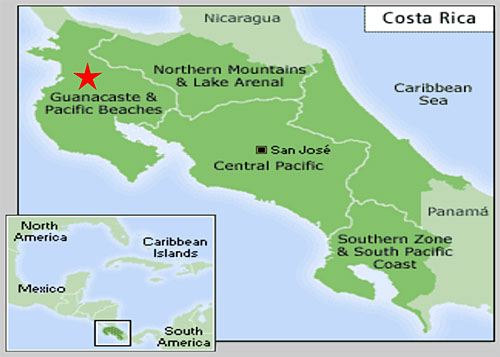
The trip is open to ANY adult interested in studying and reporting observations of hummingbirds in Costa Rica (and--after the trip--in the the rest of Central America, Mexico, Canada, and/or the U.S.). You do NOT have to be an experienced birder or scientist. We will teach you everything you need to know to participate in the project, including observing and working with hummingbirds, collecting data, etc.
Expeditions to the wintering grounds of Ruby-throated Hummingbirds are scheduled for 25 January-1 February 2008 and 3-10 February 2008. We especially encourage participation by K-12 teachers and will be happy to collaborate with them on efforts to find grants to help underwrite trip costs and/or to work with home institutions if they seek graduate credit for the experience. (NOTE: There's also an option for a U.S. or Canadian teacher to travel and participate for FREE by recruiting 12-14 high school students for a special eight-day trip; student trips can be scheduled anytime November through late February. Please contact us for details.)
Two Costa Rican K-12 educators typically receive full scholarships from Holbrook Travel and Hilton Pond Center to join the adult excursions as active participants. Their involvement will help create connections with fellow educators and students from other countries in which Ruby-throated Hummingbirds also occur.
After reading the information below, please contact Debbie Sturdivant at Holbrook Travel (1-866-748-6146) if you have any questions about enrolling and/or to request enrollment forms. Register early to guarantee you can participate!
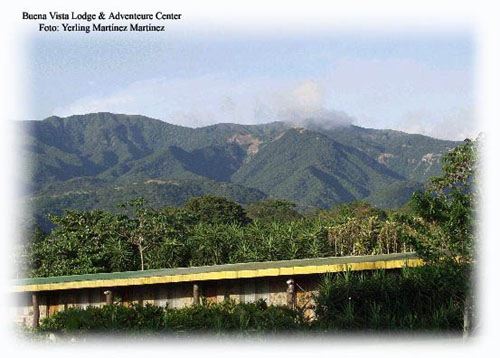
ITINERARY HIGHLIGHTS
- Observation, trapping/netting, handling & banding of hummingbirds in the field
- Training & certification for GLOBE’s hummingbird observation protocols
- Pacific Coastal Ecosystems field trip to Santa Rosa National Park and to Junquillal Beach, including swimming in the surf
- Half-day visit to city of Liberia to shop, eat & participate in local culture
- Horseback ride to volcanic hot springs
- Plenty of opportunities for independent exploration and observation and photography of fascinating tropical plants and animals
EDUCATIONAL CONNECTIONS
- Hummingbird Observation & Banding
- Neotropical Migrant Bird Behavior
- Coastal Ecosystems Ecology
- Tropical Dry Forest Ecology
- Nocturnal Animal Behavior
- On-site Serpentarium
- Biodiversity
- Volcanology & Landforms
- Conservation
- Nature Photography
- Pedagogical Field Techniques
- Research Field Techniques
- Costa Rican History & Culture
- Full certification in the Operation RubyThroat/GLOBE hummingbird observation protocols
- Optional graduate credit is available through Weber State University (some trip costs may be deductible as educational expenses and/or be eligible for loans or scholarships from outside sources; teachers should ask principals and district offices if partial funding is available locally)
- In additional to banding Ruby-throated Hummingbirds during our previous expeditions to Guanacaste Province, we also captured the following five hummer species: Cinnamon Hummingbird, Steely-vented Hummingbird, Green-breasted Mango, Canivet's Emerald (formerly Fork-tailed), and the noticeably long-billed Plain-capped Starthroat (below).
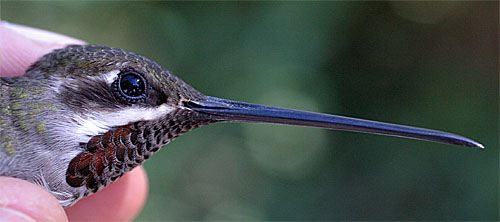
ACTIVE ADVENTURES
- Horseback riding
- Swimming
- Day hiking
- Nature exploring
- Night hikes (optional)
- Zip line through the canopy (optional)
- Unique tropical forest water slide (optional)
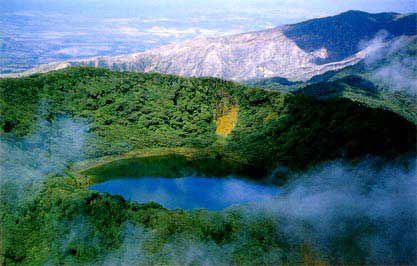
WEEK ONE DETAILED ITINERARY
(25 Jan-1 Feb 2008, Friday through Friday)
Week Two (3-10 February) follows the same itinerary except the trip is Sunday through Sunday
January 25 (Friday)--Arrival & Buena Vista Lodge & Adventure Center
- Early Afternoon: Arrive Liberia International Airport, greeted by local personnel; lunch at airport. Transported by air-conditioned tour bus to Buena Vista Lodge near Rincon de la Vieja National Park (above), home base for the week. Formerly a cattle ranch, the Lodge now focuses on ecotourism. Keeping its rustic style, the property sits on a volcanic slope (altitude 2,450') with the Pacific Ocean visible in the distance. The peak of the volcano is shrouded in clouds and is seldom visible, but in the mist frequent rainbows--and occasional moonbows!--make up for it. Of the Lodge's 2,000 acres of private reserve, approximately half are primary (virgin) and secondary forest with the rest dedicated to livestock and equestrian activities--a big part of the Guanacaste Province lifestyle. The Lodge's finca (working farm) also produces organic foods, including fruits, vegetables, milk & cheese.
- Evening: Introductions & Overview of Operation RubyThroat/GLOBE protocols and other methodologies to be used while monitoring, capturing & banding Ruby-throated Hummingbirds (Archilochus colubris).
January 26 (Saturday)--Buena Vista & Canas Dulces
- Morning: Breakfast at the Lodge. Bus to Canas Dulces to make field observations; scout for concentrations of hummingbirds; set traps and/or nets at various sites, including Aloe Vera plantations (below right) that may be one of the most important local habitats for wintering Ruby-throated Hummingbirds; record data; band and release hummingbirds as captured.
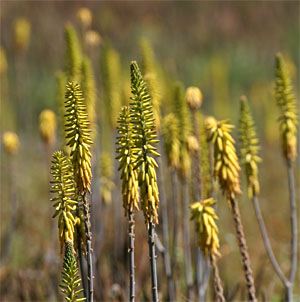
- Lunch: Back at the Lodge.
- Afternoon: Explore Buena Vista grounds on your own; great chances for observations and photos of local flora and fauna.
- Late Afternoon: Gather at El Mirador to watch sunset over Pacific Ocean.
- Supper: At the Lodge.
- Evening: Continuaton of Operation RubyThroat/GLOBE protocol instruction. Informal presentations by trip participants. (Some evenings we will have opportunities for an optional night hike for observation of nocturnal inhabitants of the Buena Vista reserve.)
January 27 (Sunday)--Buena Vista & Canas Dulces
- Morning: Continue hummingbird observations and banding at study site(s).
- Afternoon: Explore Buena Vista grounds on your own.
- Late Afternoon: Gather at El Mirador.
- Evening: Continuaton of Operation RubyThroat/GLOBE protocol instruction. Informal presentations and introduction to Costa Rican culture.
January 28 (Monday)--Buena Vista, Canas Dulces & Santa Rosa National Park
- Morning: Continue hummingbird observations and banding at study site(s). Box lunch at Canas Dulces.
- Late Morning/Afternoon: Field trip to Santa Rosa National Park. Created to preserve the field where a decisive battle was fought, Santa Rosa is a naturalist's wonder.
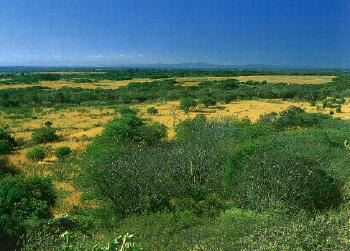 The park, covered with trails, encompasses almost all habitats of the region, from deciduous tropical hardwood forests to dry mountain regions (with cactus and thorny shrubs) to mangrove swamp estuaries near the beach. Excellent opportunities for wildlife observation and photography exist during the dry season, due to concentrations of animals such as peccaries, coatimundis, and tapirs at water holes. Within park boundaries are the beaches of Nancite and Naranjo, both among the most pristine in Costa Rica and known for mass nestings of sea turtles. Visit Junquillal Beach for an introduction to tropical coastal ecosystems. Swim in Pacific Ocean (optional). Supper en route home at "fast food" stop in Liberia. The park, covered with trails, encompasses almost all habitats of the region, from deciduous tropical hardwood forests to dry mountain regions (with cactus and thorny shrubs) to mangrove swamp estuaries near the beach. Excellent opportunities for wildlife observation and photography exist during the dry season, due to concentrations of animals such as peccaries, coatimundis, and tapirs at water holes. Within park boundaries are the beaches of Nancite and Naranjo, both among the most pristine in Costa Rica and known for mass nestings of sea turtles. Visit Junquillal Beach for an introduction to tropical coastal ecosystems. Swim in Pacific Ocean (optional). Supper en route home at "fast food" stop in Liberia.
- Evening: Continuaton of Operation RubyThroat/GLOBE protocol instruction. Informal presentations and optional night hike.
January 29 (Tuesday)--Buena Vista & Canas Dulces
- Morning: Continue hummingbird observations and banding at study site(s).
- Afternoon: Explore Buena Vista grounds on your own.
- Late Afternoon: Gather at El Mirador.
- Evening: Informal presentations and introduction to Costa Rican culture.
January 30 (Wednesday)--Buena Vista, Canas Dulces & Liberia
- Morning: Continue hummingbird observations and banding at study site(s).
- Afternoon: Trip to Liberia for family-style lunch at ethnic restaurant on the plaza; time to shop, sightsee, and catch local flavor.
- Late Afternoon: Gather at El Mirador.
- Evening: Informal presentations and introduction to Costa Rican culture.
January 31 (Thursday)--Buena Vista, Canas Dulces & Rincón de la Vieja National Park
- Morning: Continue hummingbird observations and banding at study site(s).
- Afternoon: Travel by horseback to thermal springs in Rincón de la Vieja National Park, where an active volcano (above) rises about 5,000 feet; because of cloud activity, the summit is seldom visible, so we'll content ourselves with an invigorating mud bath and soak in warm pools at the spa. Although formed by the merging of several volcanic eruptions, Rincón de la Vieja is a single mountain. On the summit, nine eruption sites have been identified, two of which are still active. Costa Rica last heard from Rincón from 1966 to 1970, when it released huge clouds of ash and rumbled underground. Rincón offers a variety of habitats to explore due to variations in altitude, rainfall, and effects of volcanic eruptions. Learn more about tropical dry forests and the species found in them, with sightings of monkeys and other small mammals, various butterflies, and up to 300 species of birds.
- Late Afternoon: Gather at El Mirador.
- Evening: Final analysis of hummingbird data & "Farewell Fiesta."
February 1 (Friday)--Buena Vista & Departure
- Morning: Depart for Liberia airport for flight home (hugs optional but likely among new friends).
- Evening: Dream in your own hometown bed about hummingbirds and warm, sunny Costa Rica!
NOTE: The main purpose of the Operation RubyThroat/GLOBE Costa Rica expedition is to learn about Ruby-throated Hummingbird "winter" behavior; thus, your active participation in making daily observations and collecting data is critical to the trip's success. We will have many wonderful and enjoyable experiences together, but this is NOT a pleasure trip--even though you'll have plenty of free time and are certain to have fun. If you are not willing to work hard all week and follow the expedition's research and education goals, please do not sign up for the trip. Scheduled activities are subject to change due to weather or to take advantage of unexpected learning and research opportunities, but we'll do everything we can to make sure we offer all non-research activities described above.
BILL HILTON JR. (below left), internationally known educator-naturalist, was twice named South Carolina Science Teacher of the Year and was honored as the state's Outstanding Biology Teacher. In 1998, The Charlotte Observer named him a Carolinas "Guardian of the Environment" for a lifetime of trend-setting work in conservation and environmental education. He has led four highly successful hummingbird expeditions to Costa Rica.
Hilton is executive director of Hilton Pond Center for Piedmont Natural History. 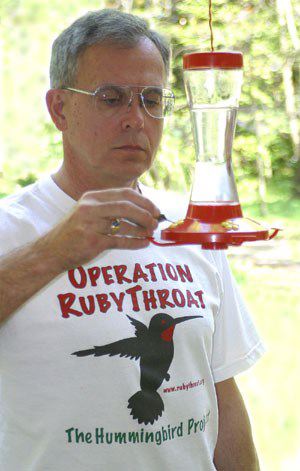 As principal investigator for "Operation RubyThroat: The Hummingbird Project," he received a 42-month grant from the National Science Foundation to integrate Operation RubyThroat with The GLOBE Program. Since 1982, Hilton has banded more than 50,000 birds at Hilton Pond, including more than 3,600 Ruby-throated Hummingbirds. As principal investigator for "Operation RubyThroat: The Hummingbird Project," he received a 42-month grant from the National Science Foundation to integrate Operation RubyThroat with The GLOBE Program. Since 1982, Hilton has banded more than 50,000 birds at Hilton Pond, including more than 3,600 Ruby-throated Hummingbirds.
Hilton taught in Rock Hill and Fort Mill SC schools, and at the University of Minnesota, St. Olaf College, and Winthrop University. He helped start the residential South Carolina Governor’s School for Science and Mathematics in Hartsville, which he served as biology instructor and director of student research.
Hilton is a nationally sought-after speaker on diverse natural history topics. He has a Bachelor of Arts in Philosophy from Newberry College, which he serves as past-president on the Alumni Board of Directors. As alumni president, he organized a major international symposium on John Bachman, founder of Newberry College and a contemporary of John James Audubon. He earned a Master of Arts in Biology Teaching from Winthrop University, and a Master of Science in Ecology & Behavioral Biology from the University of Minnesota, where he conducted a four-year field study of the behavioral ecology of Blue Jays, Cyanocitta cristata. For a complete resume, see his Biographical Sketch.
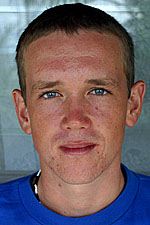 Hilton and the group will be assisted by ERNESTO M. CARMAN of Talamanca Hawkwatch and Programa Conservacion de Aves. Ernesto, a native-born Costa Rican (tico), speaks fluent English and Spanish, and is one of only a few naturalists with experience observing Ruby-throated Hummingbirds within Costa Rica. Ernesto's sharp eyes, comprehensive knowledge, and terrific personality greatly enrich our time in the field. Ernesto's family runs Finca Cristina, an environmentally friendly coffee farm that uses shade-grown organic techniques and recycles processing materials. Hilton and the group will be assisted by ERNESTO M. CARMAN of Talamanca Hawkwatch and Programa Conservacion de Aves. Ernesto, a native-born Costa Rican (tico), speaks fluent English and Spanish, and is one of only a few naturalists with experience observing Ruby-throated Hummingbirds within Costa Rica. Ernesto's sharp eyes, comprehensive knowledge, and terrific personality greatly enrich our time in the field. Ernesto's family runs Finca Cristina, an environmentally friendly coffee farm that uses shade-grown organic techniques and recycles processing materials.

TENTAIVE 2009 LAND PROGRAM COST: $1,595
(Please call Wendy Frazier, Holbrook Travel's air specialist, at
1-800-451-7111 for international airfare rates from your city. Holbrook often has access to "add-on" airfare at rates cheaper than those available to the general public.)
--Rates are based on: Double occupancy with a full roster of 12 participants and subject to increase with fewer participants. (Any participant may select a single room at a higher rate but we recommend doubling as part of the community experience.)
--Participants must be: In good health, at least 21 years of age by the time the trip begins, and willing and able to participate in field work and all education and research activities. (Special consideration may be given on a case-by-case basis for college students and for advanced, mature high school students accompanied by a parent. We also can offer a full week for a class of 12-14 high school students between November and late February; the sponsoring teacher earns a FREE trip.)
--Program cost includes: All in-country transportation, accommodations, meals, expert local guide (bilingual), learning activities and field trips, and Operation RubyThroat/GLOBE instructional materials, as stated above.
--Program cost does not include: International airfare (about $600, depending on departure point); meals at airport on arrival/departure days, one fast-food supper, and a family-style lunch in Liberia; any additional optional activities not described above; non-mealtime beverages or snacks; gratuities for local personnel; $26 departure tax; or graduate credit costs. (Please note that because of difficulty with international connections and depending on your point of origin, it may be necessary for you to spend an extra night traveling to and/or from Costa Rica.)
--Payment policy: To confirm your space, send $200 deposit to Holbrook Travel along with your enrollment form; deposit for Week One is due on or before 25 September 2007; Week Two deposit is due on 5 October. The deposit is refundable less a $100 processing fee if cancellation is received prior to 95 days. Final payment is due no later than 95 days before departure date; there will be no refunds for cancellations within 95 days of departure.
--Pre-trip activities: You will receive lists of suggested readings and resources that will enhance your trip experience. We expect that you will study and learn all important information related to the trip's research goals.
--Optional graduate credit: Contact Holbrook Travel's Debbie Sturdivant for infomation about how to apply and pay for graduate credit through Weber State University. You may also work with your local college to earn credit there.
--Tax deductions: Since the Operation RubyThroat expeditions to Costa Rica are service projects in support of a non-profit, an estimated $325 of your fees should be tax-deductible. If you are participating as part of a college degree program or are a classroom teacher, additional tax deductions may be taken--the full cost of the trip may be deductible. (In some cases, this means after taxes the trip actually will cost you nothing.)
Hilton Pond Center for Piedmont Natural History and Operation RubyThroat: The Hummingbird Project derive no financial gain from our Costa Rican excursions; trips are offered as outreach activities and as a way to learn more about winter behavior of Ruby-throated Hummingbirds. If you're interested in making a separate contribution to the Center and/or Operation RubyThroat, please see Supporting the Work of Hilton Pond Center.
After reading the information above, contact Debbie Sturdivant at Holbrook Travel by E-mail or phone (1-866-748-6146) if you have any questions about enrolling and/or to request enrollment forms. You can also enroll on-line. See you in Costa Rica!
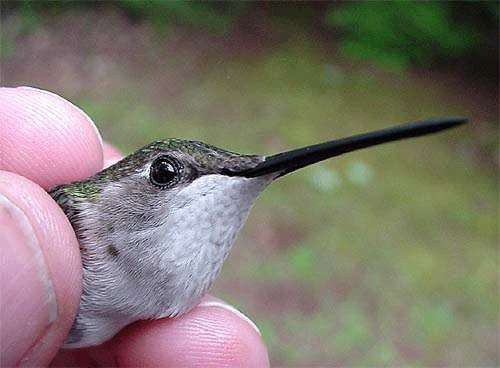
Adult female Ruby-throated Hummingbird (above),
captured for banding
All text & photos © Hilton Pond Center
Other copyrights as indicated
 INFORMATION ABOVE IS FOR THE 2008 TRIPS INFORMATION ABOVE IS FOR THE 2008 TRIPS
JUST COMPLETED.
TENTATIVE DATES FOR NEXT YEAR ARE
WEEK ONE: 24 January - 1 February 2009
WEEK TWO: 3-11 February 2009
WEEK THREE: 13-21 February 2009
PLEASE CEHCK BACK LATER FOR MORE INFO
ABOUT TRIPS FOR 2009, OR CONTACT
EDUCATION
For complete reports on our previous successful excursions,
please visit "This Week at Hilton Pond"
for 1-14 January 2005, 8-21 February 2006,
8-14 February 2007, and 25 January-1 February 2008
PLUS
See a write-up about last year's trip in the May/June 2006
Costa Rica Outdoors magazine
|

![]() INFORMATION BELOW IS FOR THE 2008 TRIPS
INFORMATION BELOW IS FOR THE 2008 TRIPS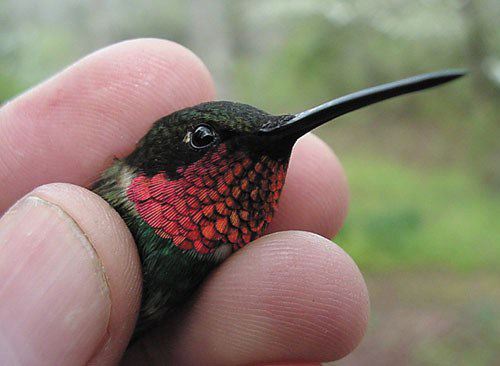
 Ruby-throated Hummingbirds Archilochus colubris--which occur in 38 U.S. states and across southern Canada from April through early October--are the most widely distributed hummingbird species. Nonetheless, they are poorly studied in Mexico and Central America where they spend their non-breeding months.
Ruby-throated Hummingbirds Archilochus colubris--which occur in 38 U.S. states and across southern Canada from April through early October--are the most widely distributed hummingbird species. Nonetheless, they are poorly studied in Mexico and Central America where they spend their non-breeding months.  During our fifth (and sixth) eight-day field trips to Guanacaste Province in northwestern Costa Rica, Center director Bill Hilton Jr. will show participants how hummingbirds are observed, captured, banded, and released and teach how to implement observational protocols that are part of "Operation RubyThroat: The Hummingbird Project" and
During our fifth (and sixth) eight-day field trips to Guanacaste Province in northwestern Costa Rica, Center director Bill Hilton Jr. will show participants how hummingbirds are observed, captured, banded, and released and teach how to implement observational protocols that are part of "Operation RubyThroat: The Hummingbird Project" and 





 The park, covered with trails, encompasses almost all habitats of the region, from deciduous tropical hardwood forests to dry mountain regions (with cactus and thorny shrubs) to mangrove swamp estuaries near the beach. Excellent opportunities for wildlife observation and photography exist during the dry season, due to concentrations of animals such as peccaries, coatimundis, and tapirs at water holes. Within park boundaries are the beaches of Nancite and Naranjo, both among the most pristine in Costa Rica and known for mass nestings of sea turtles. Visit Junquillal Beach for an introduction to tropical coastal ecosystems. Swim in Pacific Ocean (optional). Supper en route home at "fast food" stop in Liberia.
The park, covered with trails, encompasses almost all habitats of the region, from deciduous tropical hardwood forests to dry mountain regions (with cactus and thorny shrubs) to mangrove swamp estuaries near the beach. Excellent opportunities for wildlife observation and photography exist during the dry season, due to concentrations of animals such as peccaries, coatimundis, and tapirs at water holes. Within park boundaries are the beaches of Nancite and Naranjo, both among the most pristine in Costa Rica and known for mass nestings of sea turtles. Visit Junquillal Beach for an introduction to tropical coastal ecosystems. Swim in Pacific Ocean (optional). Supper en route home at "fast food" stop in Liberia.

 As principal investigator for "Operation RubyThroat: The Hummingbird Project," he received a 42-month grant from the National Science Foundation to integrate Operation RubyThroat with
As principal investigator for "Operation RubyThroat: The Hummingbird Project," he received a 42-month grant from the National Science Foundation to integrate Operation RubyThroat with  Hilton and the group will be assisted by ERNESTO M. CARMAN of Talamanca Hawkwatch and Programa Conservacion de Aves. Ernesto, a native-born Costa Rican (tico), speaks fluent English and Spanish, and is one of only a few naturalists with experience observing Ruby-throated Hummingbirds within Costa Rica. Ernesto's sharp eyes, comprehensive knowledge, and terrific personality greatly enrich our time in the field. Ernesto's family runs
Hilton and the group will be assisted by ERNESTO M. CARMAN of Talamanca Hawkwatch and Programa Conservacion de Aves. Ernesto, a native-born Costa Rican (tico), speaks fluent English and Spanish, and is one of only a few naturalists with experience observing Ruby-throated Hummingbirds within Costa Rica. Ernesto's sharp eyes, comprehensive knowledge, and terrific personality greatly enrich our time in the field. Ernesto's family runs 


 You can also
You can also